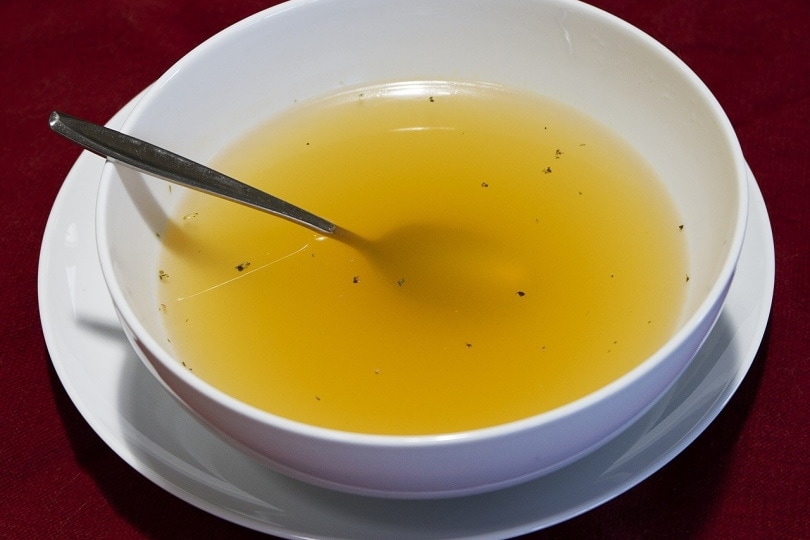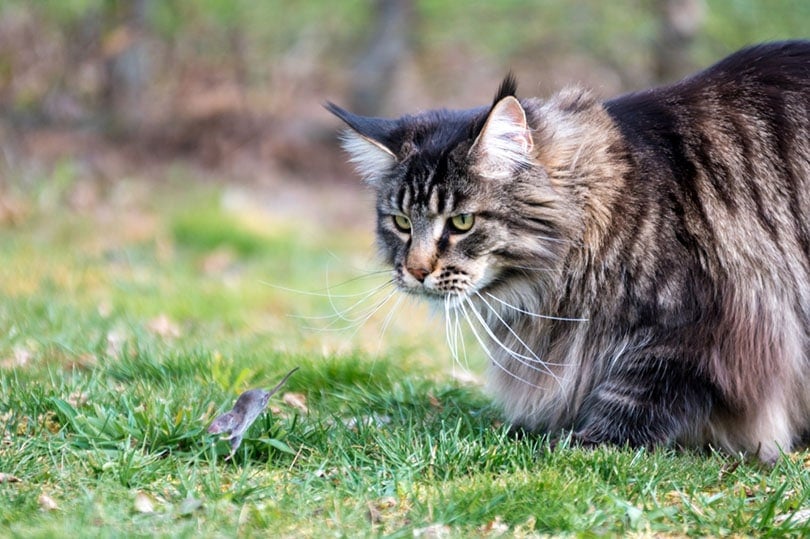Can Cats Eat Chicken Broth? Vet Approved Facts & Safety Guide
By Brooke Bundy
Updated on

As obligate carnivores, cats crave chicken. This lean protein is a common meat in many cat foods because of the low fat-to-protein ratio and because it’s relatively inexpensive and easy to source. Since chicken broth is basically liquid chicken, your kitty may crawl forward in anticipation whenever you’re making soup and you may be tempted to give them a taste of the broth.
Homemade chicken broth and chicken broth that is plain is generally okay for cats to eat in small amounts. Unfortunately, though, most commercially produced chicken broth are unsafe for cats. They include several other ingredients besides poultry. Onion and garlic are common ingredients in many broths and recipes. These seasonings are toxic to cats. Many other ingredients included in some commercial broths such as added sodium are also potentially harmful to cats, but only in amounts larger than they’d probably ingest by sipping chicken. However, the onion and garlic alone make chicken broth an unsafe snack for your cat.
Can Cats Eat Chicken Broth?
Cats can eat chicken broth that is plain and made only of chicken stock. But, since most commercially produced chicken broths contain high sodium levels, onion, and garlic, you should definitely not feed any to your cat. The jury is out on some of the other ingredients, such as carrot juice and tomato paste, but the only ingredients that are actually good for your cat in most chicken broths are chicken and turmeric. Homemade bone broth made from chicken and turmeric can work as an excellent alternative, or you can buy a broth made specifically for your cat. As when adding any new food to your cat’s diet, run it by your vet to make sure it’s suitable for your individual kitty. This is especially important if they have any food allergies, special dietary requirements or underlying health issues.

What’s in Commercial Chicken Broth?
Have you ever wondered if chicken broth is the same thing as chicken stock? Yes and no. Chicken broth includes chicken stock but is slightly different. Chicken stock is made by boiling down leftover chicken bones for hours on the stove. It’s a staple ingredient that acts as a base for many homemade soup recipes. Chicken stock is usually the safest option for cats. However, chicken broth often contains chicken stock, but also includes vegetables and seasonings especially when commercially produced.
- Chicken stock
- Chicken flavor
- Sea salt
- Carrot juice
- Onion juice
- Garlic spices
- Tomato paste
- Turmeric
Let’s break down the ingredients individually to see what ingredients are safe and which are potentially dangerous for your cat. Besides chicken stock, chicken flavor, and turmeric, almost all of the ingredients on the list are either toxic or potentially harmful to our feline friends.
Chicken Stock
Since chicken stock is made from simmering chicken bones, we can conclude that it is an excellent meal addition for cats by itself. Making chicken stock at home gives you control over what ingredients go in the pot. You might also try buying a bone broth made specifically for cats.
Sea Salt
Sea salt may be marketed as healthier than table salt for humans. However, both types pose a big problem for cats because they contain equal amounts of sodium. This compound is an essential component for life, but only in certain amounts. A highly-salted diet puts your cat at risk of developing salt toxicity, which can even be fatal. If your cat is eating cat food that meets the AAFCO nutritional standards, then they’re likely already getting their daily recommended amount of sodium. Pet parents should take care not to feed their animals blatantly salty foods to decrease their risk of ingesting too much salt.

Carrot Juice
Carrot juice isn’t toxic to your cat, but neither is it very helpful. Too much raw carrot juice can cause diarrhea, so only give them a small amount if you choose to at all.
Onion Juice & Garlic Spices
Onion and garlic belong to the same class of plants, the Allium family, that produces compounds that are toxic to dogs and cats. No part of any of these plants are considered safe, but concentrated forms such as garlic and onion powder are the most dangerous.
Tomato Paste
Tomatoes are part of the nightshade family of plants. This classification is officially called Solanaceae and also includes other human foods such as potatoes, eggplant, and peppers. Unfortunately, these plants contain harmful compounds that can make cats sick when eaten raw. Granted, the compound is mostly found in the plant itself and in unripe tomatoes, not the plump red veggie. Plus, since tomato paste isn’t a prominent ingredient, such a small amount probably wouldn’t cause any harm. However, it’s still best to play it safe and avoid giving your cat this fruit.
Turmeric
A common spice in Indian food, turmeric is a plant whose roots are often used to make a spice that has been used throughout history as a natural anti-inflammatory. It has a wide range of reported health benefits for people, dogs, and cats, from helping treat arthritis to preventing cancer. Unfortunately, there is currently very little research that has been done on cats and dogs to support its use. If you think your cat may benefit from adding turmeric to their diet or using it as a supplement, seek advice from your vet first.

Final Thoughts
Some chicken broths are unsafe for cats, as well as any other dish containing onion or garlic, or other heavily salted foods. If you decide to look for a commercially produced bone broth, make sure it doesn’t contain any toxic seasonings such as garlic powder. Buying broths made specifically for cats or making your own from scratch is the best way to ensure that no harmful substances reach your pet.
Featured Image Credit: LisaRedfern, Pixabay












